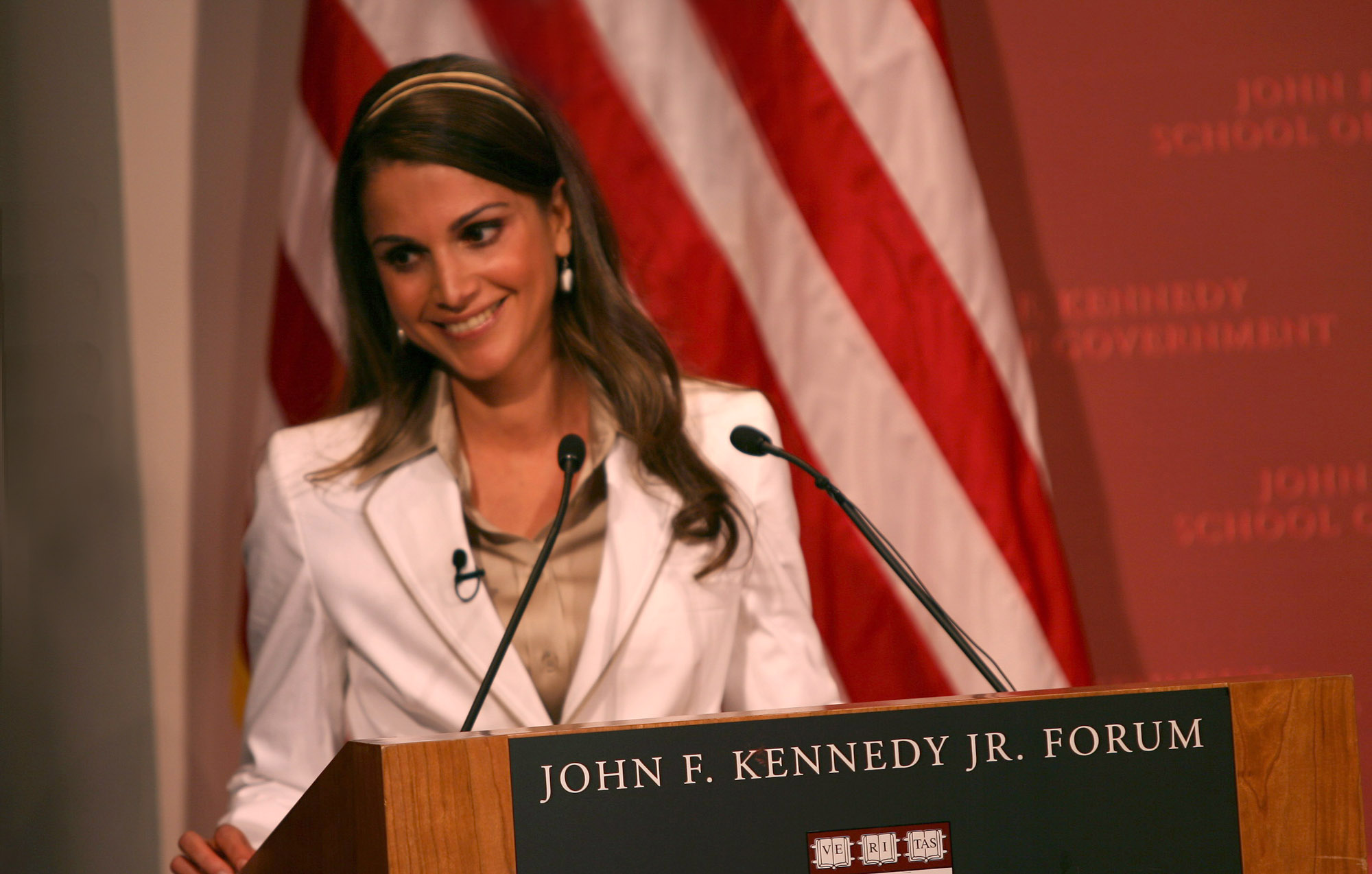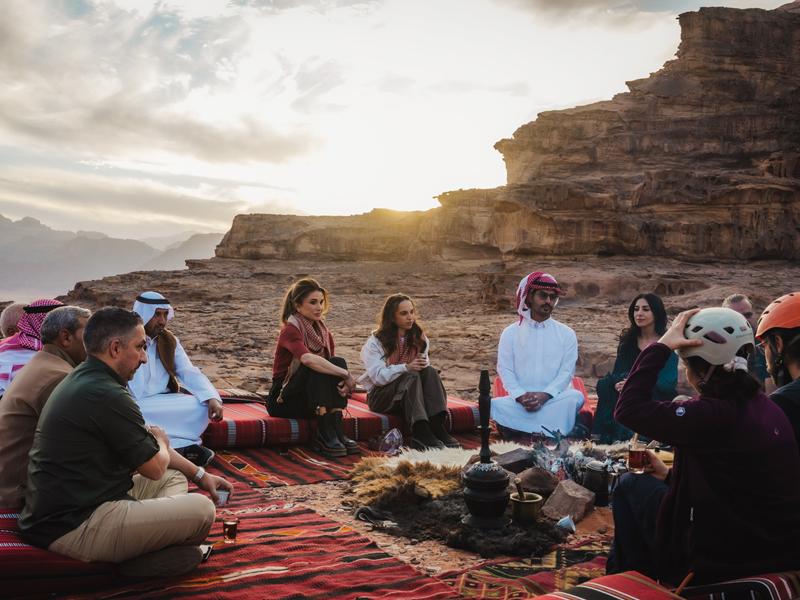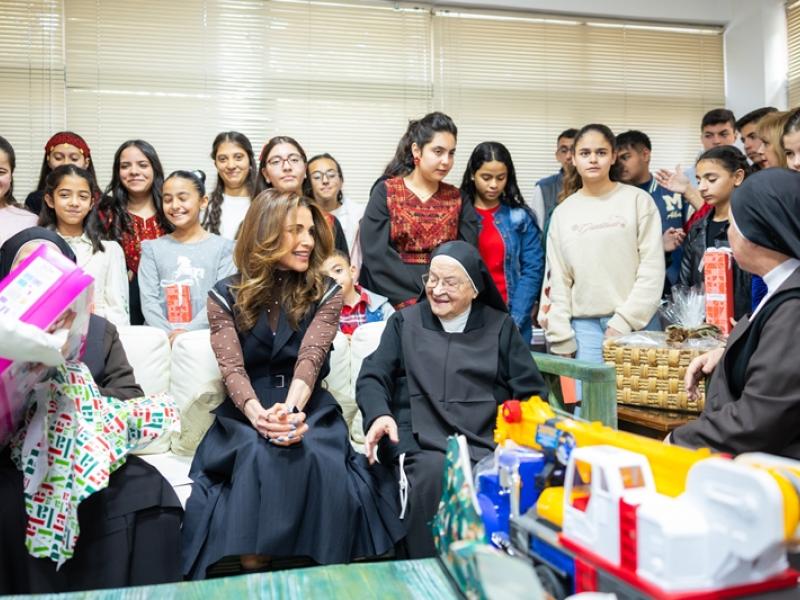(Office of Her Majesty, Press Department – Boston) In a speech at Harvard University's Kennedy School of Government, Her Majesty Queen Rania Al-Abdullah warned of the growing rift between East and West, and urged students to concentrate their efforts in bridging that gap. "The gulf between narratives is wide – and only getting wider," she said, "and as a result, I fear a creeping affliction on both sides of what the philosopher William James called 'the blindness in human beings' that prevents us from understanding the feelings of those 'different from ourselves.'" "No matter where we come from, what we look like, how we dress, or to whom we pray, when it comes to what makes us laugh or cry, when it comes to what we dream of for ourselves and for our children, when it comes to how hard we work each day, we are usually more alike than we are different, " said Queen Rania. Playing on Martin Luther King, Jr.'s description of a great "world house", Her Majesty referred to the world community as neighbors in a row of bunkers. "The East has occupied one room and the West is in another. And though the landscape outside their windows is the same, they see it very differently because the windows themselves are tinted by each side’s experience and perspective," she said. The Queen referred to the future of her own four children, saying "I do not want them to grow up in a house like this. I do not want them to inherit a divided, angry world, where East and West have hunkered down, alone in separate rooms." Acknowledging the different points of view that exist, specifically on issues related to Palestine and Iraq, Her Majesty said there is a "gap in perceptions of the Middle East – where mutual failure to appreciate the other side’s point of view is a greater barrier to communication than speaking different languages." The Queen tried to summarize the different perspectives from both sides, saying "I would like to try to speak as a neutral observer – as someone who has looked out of both sets of windows, and witnessed the contrast in view. My aim is not to pass judgment. I do not want to tell you what to think – but rather, to highlight the diverging narratives the different ways that East and West interpret reality." "On the issue of Palestine, for example, looking out an American window, the first thing you might see is terrorist attacks against Israelis, and Israel’s paramount obligation to protect its people from harm," she said, "But looking through an Arab window, the image in the foreground is generations of Palestinian boys and girls growing up with no country, no rights, and no future – and that image has not changed for 50 years." "Looking out at Iraq, I think both sides would agree they see a mess. But where they differ, perhaps, is on the role of the American troops. From the Arab perspective, Iraq is a country whose people have suffered for decades – and whose lives have become even worse since the U.S. invasion and occupation. Through the Arab window, the American presence is unwanted, unwelcome, and unjust. However, when Americans look through their windows, most see U.S. troops performing honorably and heroically - doing their best in very difficult circumstances to put a broken country back together." Other differences in perception include the status of Arab women, and the way each side views Islam, she said. "Through Western windows, Arab women may look passive and oppressed – from the way they dress to the role they play in the home and family unit," she said, "Eastern eyes, however, see Arab women taking an ever greater role in society – as doctors, lawyers, teachers, journalists, politicians, and entrepreneurs and, at the same time, because Arab culture venerates the family, a woman’s predominant role in the household is seen as a source of strength." "For many in the East, Islam is a fundamental part of life – a guiding light that emphasizes mercy, charity, tolerance, and peace. But for many in the West, perceptions of Islam – what it stands for, what it means – are bound up with the savagery of 9/11. Thus, looking out the Western window, Islam seems like a threat – personified by terrorists who claim to act in God's name. But looking out the Eastern window, Islam is under siege – distorted by violent extremists from within and demonized from without." But she reminded the hall filled with college students, "Our world house has a common room as well. It is a room where color, race, and creed do not get in the way – not because those things do not exist, but because they aren't important. What's important in the common room are the values that we share – the basic beliefs that each of us is worthy of respect." Many of Queen Rania's programs have focused on finding such a common ground and bridging the cultural divide between East and West because, she believes "that explicit recognition of our common humanity is an indispensable condition for peace and progress around the globe." "The common room is where people of goodwill come to work for the common good. To put an end to violence. To fight for peace. To build a world fit for children. To use our abundant resources and talents to eradicate global poverty and turn national borders into global gateways that connect us, not keep us apart," she said. "It seems to me this university is just the kind of place that can help turn the vision of the common room into a common way of life," said Queen Rania as urged the students to do all they can to bridge the divide, "Let your Harvard credential signify moral courage and compassion. Let it mean you approach a stranger with an open mind and an open heart. Let it mean the spirit of the common room is with you, wherever you go. And know the people of Jordan will always be ready to meet you there."
Media Taxonomy Menu
Media Taxonomy Menu
Queen Rania Stresses Common Values, Urges Students to Bridge Cultural Divide



